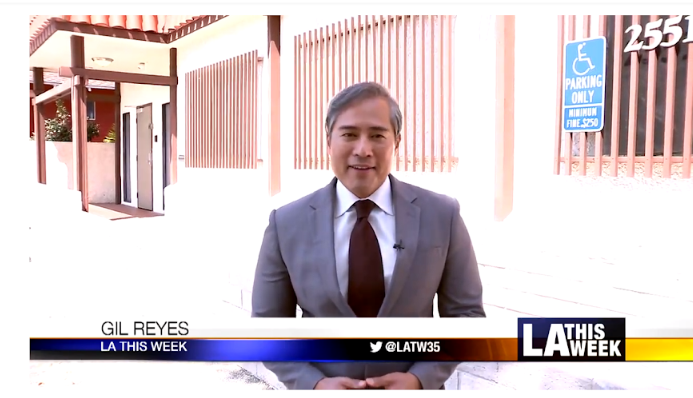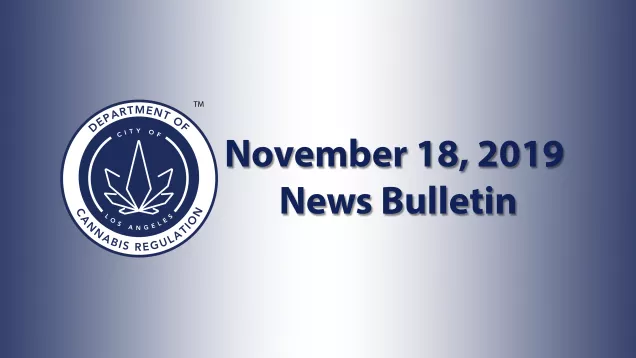

November 18, 2019
![]()
From the Desk of Cat Packer
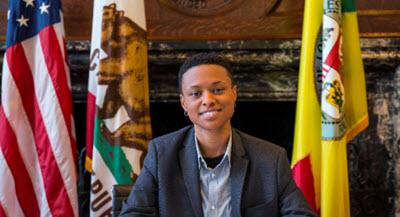
As the Executive Director of the Los Angeles Department of Cannabis Regulation (DCR), I want to thank you for your interest in the City’s cannabis related policies and programs.
Less than two years ago, while establishing critical and reformative first-time policies to license and regulate both medical and adult-use commercial cannabis activity in the world’s largest cannabis market, the City of Los Angeles became one of the first jurisdictions in the nation to establish commercial cannabis licensing related policies aimed at acknowledging and repairing the harms caused by the failed war on drugs and the disparate enforcement of cannabis prohibition. These policies created a framework for the City’s Social Equity Program, whose purpose is to promote equitable ownership and employment opportunities in the cannabis industry in order to decrease disparities in life outcomes for marginalized communities, and to address the disproportionate impacts of the War on Drugs in those communities; objectives to which DCR remains actively committed to achieving.
The two principal components of the Social Equity Program established by local law include Priority Processing of commercial cannabis license applications, and Business, Licensing and Compliance Assistance (BLC), both of which still hold the promise of equitable opportunity despite a number of challenges surrounding their implementation.
For example, local law established that eligible Social Equity Program Applicants would have Priority Processing compared to non-Social Equity Program Applicants, but only after the first two phases of Priority Processing were administered to transition the City’s existing medical businesses into the regulated cannabis market.
Furthermore, our local laws established that eligible Social Equity Program Applicants would have access to BLC Assistance in the form of educational programming and services. This assistance is intended to help applicants navigate the licensing and application process, to appropriately prepare applicants to identify and protect against predatory practices, and to assist applicants seeking to operate a compliant commercial cannabis business.
While continuing to administer and implement the City’s laws related to Priority Processing for Phase 1 and Phase 2, and while working diligently with community stakeholders to secure necessary resources to support BLC Assistance of the Social Equity Program, DCR and City Leaders received a tremendous amount of feedback and input from prospective Social Equity Program Applicants, and those who advocate on their behalf, regarding the structure of Phase 3.
In February of 2019, DCR convened with community stakeholders and City leadership to explore options for the most equitable type of licensing methodology for Social Equity Program Applicants in Phase 3. At this gathering, and later through a report/s, DCR articulated the various benefits and risks associated with each of the proposed methodologies of licensing; namely first-come first-served, lottery, or a merit-based system.
Although there was not a broad consensus on the most equitable licensing method, feedback from prospective Social Equity Program Applicants was largely divided into two different groups -- those who claimed to have secured property and were experiencing financial hardship waiting for the application process to begin and those who expressed a need for Business, Licensing and Compliance Assistance prior to the opening of the application process.
On April 30, 2019, local law was amended to divide the remaining retail license opportunities (of approximately 250 available licenses) into two rounds, whereby 100 Social Equity Program Applicants would be determined eligible for further processing in the first round and approximately 150 Social Equity Program Applicants would be determined eligible for further processing in the second round, both on a first-come, first-served basis. Additionally, DCR was instructed to begin pre-vetting Social Equity Program Applicants no later than May 28, 2019 and to begin Phase 3 Retail Round 1 no later than September 3, 2019.
Over the subsequent four months, DCR worked with the developer of DCR’s online application system, Accela, to configure the system for pre-vetting and the first-come, first-served Phase 3 Retail Round 1 application submission process. Through shared efforts, DCR and Accela were able to deliver a platform capable of executing the City’s stringent process, and preparing the Department to accept applications as instructed on September 3, 2019.
DCR staff worked around the clock to administer the pre-vetting process whereby DCR was able, in a two month period (May 28 to July 29), to verify over 1,600 Social Equity Program Applicants based on the eligibility criteria established by local law, and similarly worked diligently to inform prospective applicants on the requirements of the Phase 3 Retail Round 1 application via multiple communications efforts (see the Recent DCR Alerts & Updates section below) and various workshops conducted City-wide. Recognizing that formal Business, Licensing and Compliance Assistance was still under development and unavailable to those participating in the Phase 3 Retail Round 1 (DCR was not allocated funding for BLC until July 1, 2019), the goal was to establish a process that was consistent with local law, as well as fair and simple for Social Equity Program Applicants, from both a substantive and technological standpoint.
When the Phase 3 application window opened on September 3, 2019, hundreds of applications were submitted, and many verified Social Equity Programs Applicants were surprised to learn that they were among hundreds of others vying for the same 100 licensing opportunities.
In total, during the 14-day application period, DCR received 802 applications from verified Social Equity Program Applicants, each of whom made respective investments and risks associated with the licensing process. Understanding the significance of those risks and investments, and the importance of the Social Equity Program both historically and presently, DCR made an intentional effort to ensure the integrity of this process.
As such, when the Department learned that circumstances allowed a number of applicants to have early access to the online application, DCR immediately took reasonable and appropriate actions to ensure that applicants were not unfairly advantaged or disadvantaged by those circumstances.
I personally addressed these circumstances and other issues of concern to the community at the October 24, 2019 convening of the Cannabis Regulation Commission. Please review the presentation here and listen to the meeting audio here.
DCR recognizes the imperfect nature of this process, but we are confident that the integrity and fairness of the process has not been compromised. Nevertheless, the imperfect nature of policy implementation has fueled mass speculation and contention. As such, DCR is actively engaged in conversations with stakeholders, City Council, and the Mayor’s Office about how to move forward in an appropriate and equitable manner. Last week, the Mayor called for a third-party independent review of the application process for Phase 3 Retail Round 1, and further stated that the final licensing process will not continue until the completion of the audit.
In the interim, and as required by local law, the Department will continue to process Phase 3 Retail Round 1 applications as established in LAMC 104.06.1 until 100 Social Equity Program Applicants are determined to be eligible for further processing. However, the Department will not continue to the next phase of licensing until the audit process is complete.
Still, the Department is extremely empathetic to the concerns of the Community and is working actively with City leaders and community stakeholders to seek, consider, and recommend any legislative changes and policy amendments that may be necessary to ensure the fidelity of the nation’s largest cannabis licensing regime.
The Department takes the tremendous feedback we have received from stakeholders related to Phase 3 Retail Round 1 very seriously and welcomes additional stakeholders to share their recommendations via cannabis@lacity.org. Furthermore, DCR recognizes the immense importance of transparency and integrity in all actions the City undertakes. To that end, the Department encourages anyone and everyone to report any ethics violations to the Los Angeles City Ethics Commission.
It is critically important for those involved in or impacted by the continuous development and implementation of cannabis policy to share their feedback with policy makers. DCR is committed to supporting the facilitation of this community feedback to our local elected officials to ensure that we have policies and programs that are reflective of the community.
Over the course of the last two years, the development and implementation of the City’s licensing and regulatory program, along with its Social Equity Program, has often been a challenging but critically important responsibility -- and one that has never been done before. I take this responsibility very seriously, not simply because it’s my job to do so, but because I recognize and believe that equity should be the center of all policy development -- especially cannabis policy, due to the historic and current inequities and disparities that exist in communities most impacted by cannabis laws and their enforcement.
During my two years in this role, I’ve seen the City make significant progress towards centering equity in the development and implementation of cannabis policies; however, there’s still much work to be done to ensure that the entirety of our efforts are fair, transparent, and administered with integrity. Thus far, our collective work has centered around equity in commercial cannabis licensing, and we’re making significant progress towards that end with the hiring of our Social Equity Program Director, the upcoming release of an expanded social equity analysis, and the active development of Business, Licensing and Compliance Assistance to be available before any future retail licensing. However, I actively encourage all those involved in or impacted by this conversation, including myself, to personally recommit to work to expand our definition of equity by incorporating conversations about legal access, health equity, community safety and law enforcement, criminal justice, community reinvestment, and the many other ways cannabis policy impacts our community. These may be some of the toughest conversations we have, but I am convinced they will be among the most important as those across the country and across the globe continue to follow the trails we blaze.
![]()
Social Equity Program
BCC Awards DCR Significant Grant from the California Cannabis Equity Act of 2018
The Bureau of Cannabis Control announced it will be awarding the City of Los Angeles $1,834,156.38 in grant funding from the California Cannabis Equity Act of 2018. A total of 10 jurisdictions across the state were awarded grants to help fund their local Social Equity Programs. More information can be found on the Bureau of Cannabis Control’s website here. Los Angeles will be utilizing this funding to provide verified Social Equity Program Applicants various benefits including, workshops and training sessions focused on Business, Licensing and Compliance Assistance, Technical Assistance, Workforce Development, and Business Development Services.
DCR Issues RFQ for Social Equity Program
DCR is completing an RFQ to identify and retain qualified, on-call consultants to provide verified Social Equity Program Applicants and Licensees, Curriculum for Workshops, Incubators and other Business and Workforce Development Skills Training. The RFQ was released on June 5, 2019. Responses were due by 4 p.m. on July 12, 2019. Since the RFQ deadline, DCR has interviewed numerous professional services consultants and deemed five to be responsive and responsible. DCR is currently working with these consultants to develop world-class training curricula for Los Angeles’ stakeholder community.
Phase 2 Compliance Workshop
On November 23, 2019, from 2 p.m. to 4 p.m., DCR will be hosting a Phase 2 Compliance Workshop in Robert F. Deaton Auditorium located at 100 West 1st Street. The Workshop is intended to educate Phase 2 Applicants on the entire inspection process, and the specific components of what is required to be in compliance with DCR and LAFD. If you are a Phase 2 Applicant who is interested in attending, you can RSVP for the workshop here.
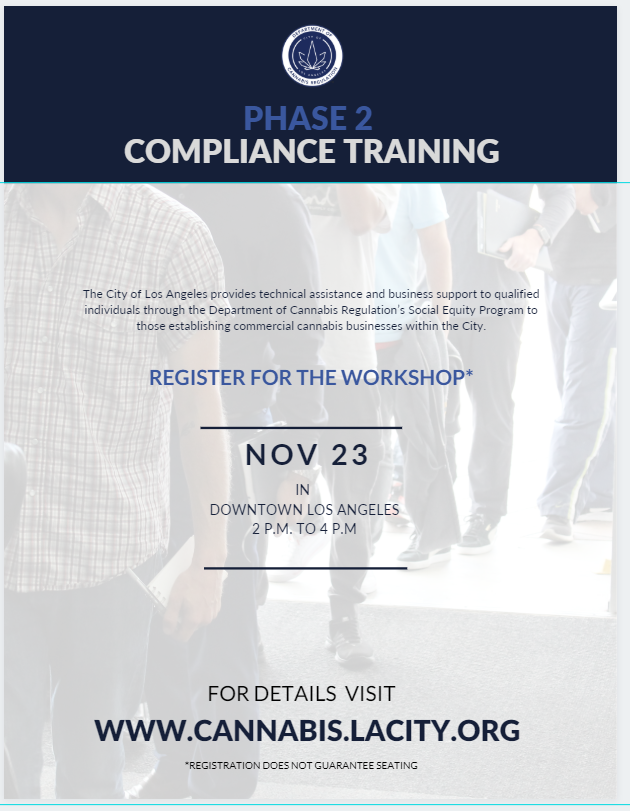
![]()
Legislative Activities & Policy Updates
State:
Governor Newsom has signed a number of bills in the last month that will impact the cannabis industry in Los Angeles. Included among them are:
AB 37 - Personal income taxes - This bill will allow licensed cannabis operators to claim 280E tax deductions on their state tax returns. This will allow the licensed cannabis industry to start to write off business expenses on their state taxes.
AB 1810 - Transportation: omnibus bill - This bill will close a loophole in state law that allowed for cannabis consumption in limos, buses, taxis, campers, and other chartered vehicles.
SB 34 - Cannabis donations - This bill will allow medical cannabis retailers to donate medical cannabis to patients, providing they meet specified requirements.
SB 595 - State licensing fee waivers for needs-based applicants - This bill, once it’s funded by the Legislature, will allow the state to offer deferrals or waivers to needs-based applicants for state application fees, licensing fees, and renewal fees.
Federal:
Congress has continued to hold hearings and vote on cannabis legislation this legislative cycle. In September, the House of Representatives passed the SAFE Banking Act that, if passed by the Senate and signed by the President, would give licensed cannabis businesses nationwide access to the banking industry. The SAFE Banking Act is currently in the Senate Banking Committee awaiting a hearing.
![]()
Community Outreach & News
2019 Congress of Neighborhoods Held September 28, 2019

DCR once again participated in the Department of Neighborhood Empowerment’s Congress of Neighborhood event. Held at City Hall on Saturday, September 28, DCR representatives answered questions about cannabis laws, regulations and the commercial licensing process. DCR Executive Director Cat Packer spoke to members of the community during a City Programs Forum workshop. This annual event serves as a day of education and networking for neighborhood council leaders.
Recent DCR Alerts & Updates
11/23/19 Phase 2 Compliance Workshop
10/17/19 DCR Announces RFQ Release Conferences for On-Call Business Development Services
9/26/19 P3RR1 Application List
9/6/19 Phase 3 Retail Round 1 Application Process
9/3/19 Phase 3 Retail Round 1 Application Window Opens Today
8/26/19 Accela System Update
8/19/19 Phase 3 Retail Round 1 Application Window Opens September 3, 2019
8/15/19 DCR Update: Phase 3 Retail Round 1 Application Process
8/13/19 Server Maintenance Notification
![]()
Cannabis Regulation Commission
The Cannabis Regulation Commission holds public hearings related to the issuance of Licenses to engage in commercial cannabis activity. In addition, the Commission may recommend to the City Council amendments to the City's Rules and Regulations. To learn more, please visit the Commission webpage.
Regular meetings are held at City Hall, 200 North Spring Street, 3rd Floor, Los Angeles, CA 90012 on the first and third Thursdays of the month at 2:00 p.m. From time to time, the Commission Executive Assistant may notice a different date, location or start time as operational needs require, and without prior approval from the Commission, upon giving proper notice to members of the public. The next scheduled Commission meeting is December 5, 2019.
Updates from the Cannabis Regulation Commission Meeting held October 24, 2019
The Commission met on October 24, 2019 and adopted updated rules and procedures, as well as received a report from DCR Executive Director Cat Packer. The report presentation can be accessed here. In the report, Executive Director Packer made the following proposed policy recommendations for the Commission to consider:
- Amend local law to extend the period of license ineligibility for a person with a felony conviction of a crime involving fraud, deceit, or embezzlement for a period of 5 years from the date of conviction to 20 years.
- Amend local law to prohibit persons with a felony conviction of a crime involving fraud, deceit, or embezzlement from serving as an Agent for Service of Process.
- Amend local law to require DCR to provide Social Equity Program Applicants Business, Licensing and Compliance Assistance focused on contracting related to Equity Share Compliance for a period of at least 60 days prior to any future Retail Licensing.
- Amend local law to allow DCR to authorize businesses to relocate within their existing Community Plan Area.
- Amend local law to require DCR to collect demographic information from applicants and licensees.
- Amend local law to require DCR to post Corporate Social Responsibility Report Criteria by July 1, 2020.
The Commission voted to adopt these recommendations and deliver them to City Council.
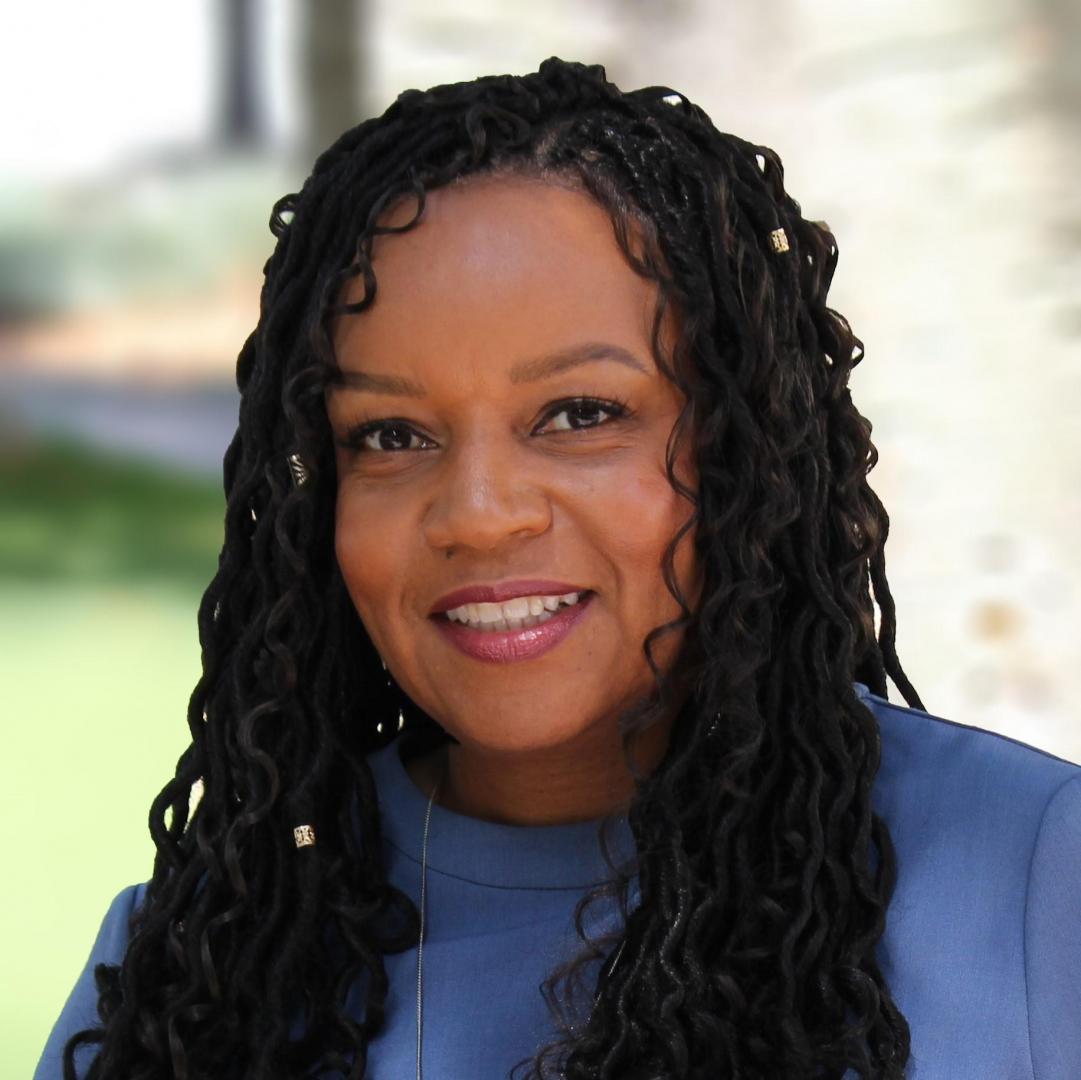
DCR Welcomes the Cannabis Regulation Commission’s Newest Commissioner
Mayor Eric Garcetti appointed Thryeris Mason to the Cannabis Regulation Commission on August 1, 2019. Thryeris is a Workers’ Compensation industry veteran, a civic leader and a native Angelino. She previously managed the day-to-day operations of the workers’ compensation benefit delivery program for Ameron International Corporation, a multinational manufacturing company. She also served on the Government Affairs and Educational Committees of the California Self-Insurers Association where she analyzed and commented upon pending legislation and planned educational conferences for self-insured entities. Thryeris was re-elected as President of the Empowerment Congress North Area Neighborhood Development Council in June 2019. She previously held this position for one year, and prior to that, served as an At-Large Representative for two years. Since August 2017, she has also been the Chair of the South Los Angeles Alliance of Neighborhood Councils. In both capacities she has been a passionate advocate for economic development, social justice, and social equity. She is a proud alumna of Loyola Marymount University in Los Angeles, California, where she earned a Bachelor of Science Degree in Business Administration. She also holds a Master of Business Administration from the University of Phoenix.
![]()
The More You Know
Los Angeles and the Unlicensed Market
The City of Los Angeles and City Attorney Mike Feuer take unlicensed cannabis shops very seriously. Since adult-use cannabis became legal in 2018, the City Attorney has been prosecuting 394 cases involving 313 unlicensed locations, shut down 197 unlicensed locations, and took on 1,462 defendants.
In his weekly message found here, City Attorney Feuer talks about why unlicensed cannabis poses major issues to public health and safety, what he and his office are doing to combat it, and what the public needs to know.
Statewide Education Campaign Urges Consumers to Shop Licensed Retailers
The California Bureau of Cannabis Control launched a statewide public information program intended to encourage consumers to purchase cannabis and cannabis products from licensed businesses.
The goal of the “Get #weedwise” campaign is to educate consumers about the risks associated with cannabis purchased from unlicensed businesses. The campaign also educates unlicensed businesses about the need to get licensed and the consequences of continuing to operate without a license. Currently, all commercial cannabis businesses in California must have a license from the state and comply with local rules related to commercial cannabis activity in their local jurisdiction.
The multilingual campaign warns consumers about dangerous, foreign material – including chemicals, mold, and fecal matter – that can be found in illegal, untested cannabis. The campaign will also include alerts to illegal businesses informing them that they could face confiscation of cash or cannabis by engaging in unlicensed activity. Please click here for more information.
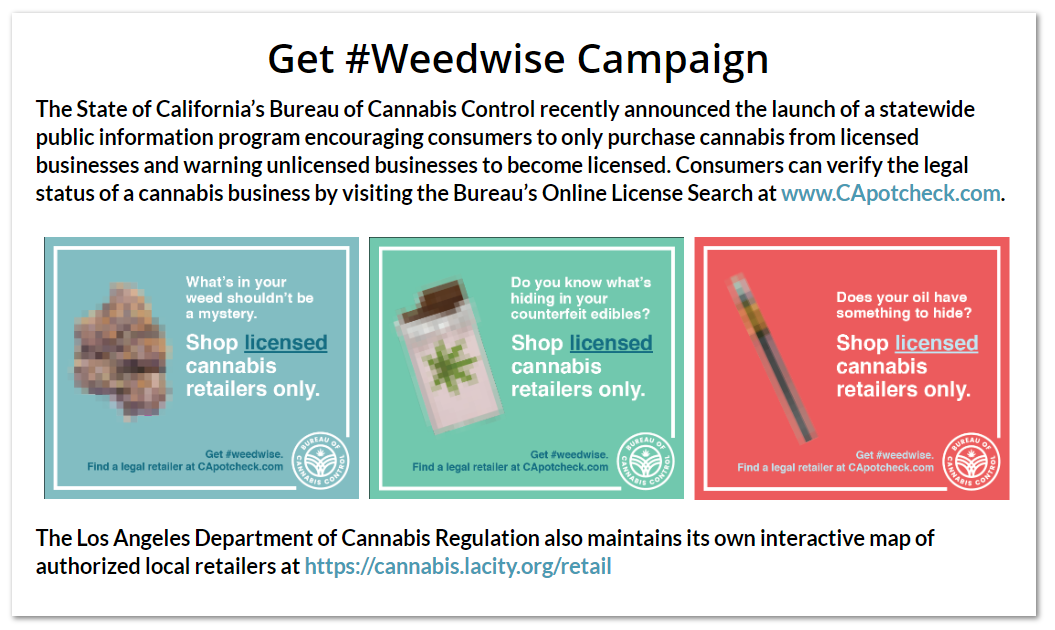
DCR Information Now Available in Over 100 Languages
All of the details included in this bulletin, as well as every page on the DCR website, are now available in over 100 different languages through the Google Translate feature found at the top right corner of the DCR website. Just click on the word “Translate” and choose your language.

DCR also provides English-to-Spanish translators and Spanish-speaking staff at our various workshops and one-on-one clinics.
We have translated our first brochure, Guide to Adult-Use Cannabis a Sales Consumption Within the City of Los Angeles into Spanish! It is available to print here.
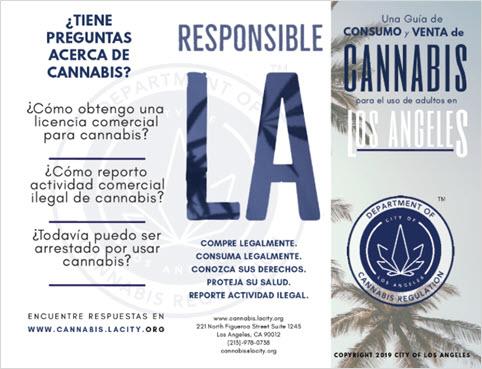
![]()
Helpful Resources & Information
The City of Los Angeles has established Rules and Regulations regarding licensed cannabis retailers. For example, did you know that the following activities are prohibited at the business premises of a legal cannabis business?
- The sale of alcoholic beverages and tobacco products
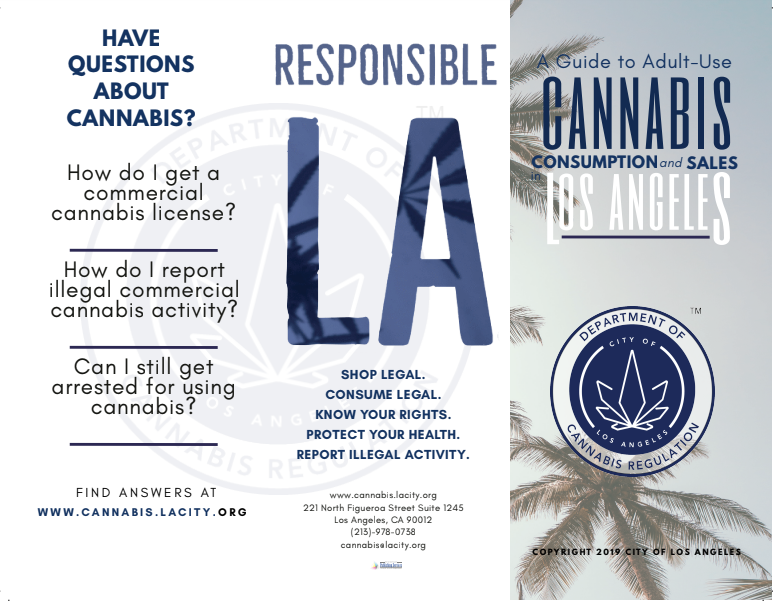
- The consumption of cannabis and alcohol
- The issuance of physician recommendations or approvals
- The giving away of free samples
Know what to expect when patronizing a licensed retailer by familiarizing yourself with this information from the DCR website.
For information on What’s Legal and What’s Not, as well as health and prevention resources in your area, check out our Resources webpage.
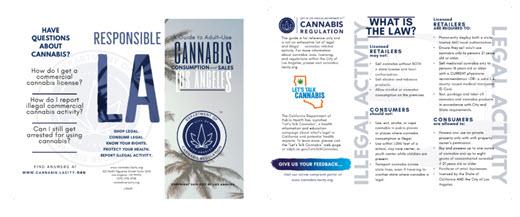
Please remember that although California legalized cannabis in 2018 -- not every cannabis activity is lawful; and even when following the law, it's just as important to practice responsible behavior. For more information about what’s legal and how to stay responsible, please check out these videos, courtesy of our friends at LACityview35.
|
Credit: LACityview35 |
|
![]()
Find Authorized Retailers
To purchase cannabis products tested for harmful pesticides and toxins, be sure to patronize authorized retailers. Find your nearest authorized commercial cannabis retailer with the click of a button on our interactive map at cannabis.lacity.org/legal-businesses.

------------------------------------------------------
To lodge a complaint about any cannabis activity in the City of Los Angeles - licensed or unlicensed, please use DCR’s complaint portal.
To get the latest information from the Department of Cannabis Regulation, Sign Up for Email Alerts.



